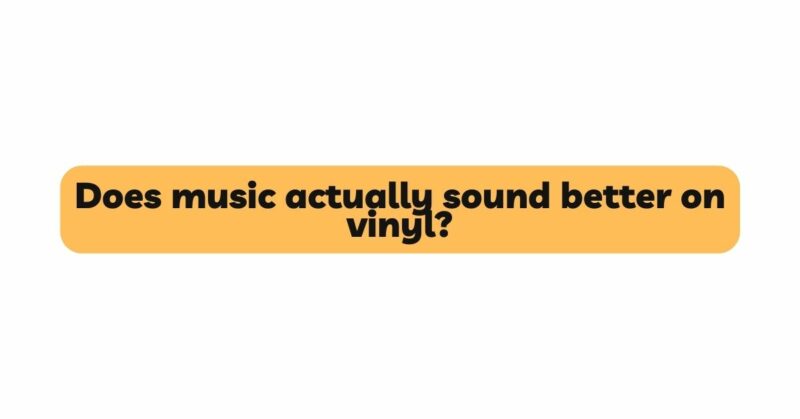In the age of digital streaming and instant accessibility, vinyl records have staged an unexpected comeback, captivating audiophiles and casual listeners alike. As record players spin once again and needle meets groove, a central question emerges: Does music actually sound better on vinyl? This article embarks on a comprehensive exploration of the vinyl phenomenon, dissecting the scientific, emotional, and perceptual aspects that contribute to the debate surrounding the sonic superiority of analog sound.
The Analog Magic: A Tale of Sonic Warmth
Vinyl enthusiasts often extol the virtues of analog sound, attributing it to a characteristic warmth that digital formats seemingly lack. Analog recordings, which trace their origins back to the late 19th century, employ continuous physical variations to capture sound waves. When these sound waves are translated onto vinyl, they retain a unique authenticity that many argue cannot be replicated by digital counterparts. The inherent imperfections of vinyl, such as background noise and subtle distortions, contribute to a sense of raw realism, endearing the format to those who seek an unfiltered connection with the music.
The Vinyl Experience: Artistry Beyond Sound
Beyond sonic attributes, the allure of vinyl lies in the comprehensive experience it offers. Engaging with vinyl records encompasses more than just sound; it incorporates tactile sensations, visual aesthetics, and a connection to the past. The act of physically handling a record, admiring its artwork, and lowering the needle requires active participation, encouraging listeners to immerse themselves fully in the music. This multisensory engagement often results in a heightened emotional connection to the music, potentially enhancing the perception that music sounds better on vinyl.
The Digital Revolution: Precision vs. Warmth
While vinyl aficionados celebrate analog warmth, digital technology has revolutionized the way music is recorded, produced, and consumed. Digital audio offers unparalleled precision, allowing for pristine sound reproduction and manipulation. However, the digital realm is not without its critics; some argue that the clinical precision of digital sound lacks the depth and personality that characterize analog recordings. The quest for sonic perfection in digital formats sometimes leads to a sterile quality, fueling the preference for the more organic, imperfect charm of vinyl.
Mastering and the Vinyl Advantage
A pivotal point in the vinyl vs. digital debate centers on the mastering process. Vinyl records require specialized mastering to optimize sound for the medium’s unique characteristics. The mastering engineer fine-tunes the dynamics and frequencies, making adjustments to accommodate vinyl’s limitations. This tailored approach can lead to an output that capitalizes on vinyl’s strengths, potentially enhancing the listening experience. Thus, music mastered for vinyl is curated to suit the format’s nuances, providing a distinct soundscape that sets it apart from digital renditions.
The Subjective Lens: Perception and Nostalgia
The perception of sound quality is inherently subjective and can be influenced by various factors. Nostalgia plays a significant role, as those who grew up with vinyl often associate it with cherished memories and a particular era of music. This emotional resonance can color the perception that music sounds better on vinyl, as the medium becomes a conduit for reliving the past. Additionally, cognitive biases can come into play, as listeners might consciously or unconsciously attribute certain qualities to vinyl that enhance their enjoyment.
Context and Environment
The environment in which music is enjoyed plays a vital role in shaping the listening experience. Vinyl records demand a dedicated and mindful approach—each record requires attention, from handling to cleaning to playback. This intentional listening environment can lead to a greater appreciation of the music, enhancing the perception that it sounds better on vinyl. Conversely, digital formats often accompany multitasking and background listening, which may dilute the immersive experience.
The Quality Question: Vinyl Pressings
A key factor affecting whether music sounds better on vinyl is the quality of the pressings themselves. The vinyl revival has led to an increased demand for production, which, at times, has resulted in variations in pressing quality. Well-crafted pressings from reputable manufacturers can deliver remarkable sound quality, emphasizing the format’s unique attributes. However, subpar pressings can result in an underwhelming experience, obscuring the benefits of vinyl. Thus, the quality of the vinyl itself can sway the perception of sound superiority.
Conclusion
The question of whether music actually sounds better on vinyl is complex and multifaceted. The appeal of vinyl extends beyond sonic attributes, encompassing a blend of sensory engagement, emotional connection, and the preservation of an analog tradition. Analog warmth, imperfections, and multisensory engagement contribute to the allure of vinyl, but it’s not a universally agreed-upon truth.
The vinyl experience resonates differently with each individual, shaped by personal preferences, context, and historical connections. While digital formats offer unparalleled precision, vinyl’s organic charm and the deliberate act of engaging with the medium continue to attract a devoted following. In the end, the perceived sonic superiority of music on vinyl resides in the ear of the beholder, where subjectivity and nostalgia intertwine to create a tapestry of auditory wonder.


